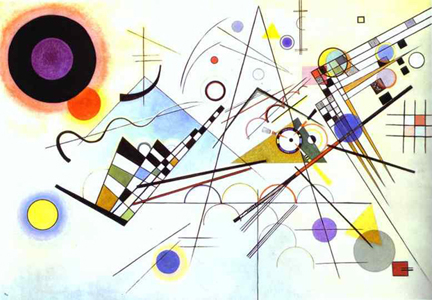Quilt top from the 1970s
Minimalism is a term that describes a composition
with few elements.
Sonia Delaunay
JoJo 1969
Wassily Kandinsky
Composition VIII 1923
Modernists pushing abstraction tried to eliminate the non-essentials. Some theorized that the
essentials involved only basic color and basic shapes. Basic color included the
primaries: red, blue and yellow. Basic shapes were circles, squares, triangles and
rectangles.
Study for an exhibit poster about the Bauhaus
by Herbert Bayer
Detail of a Mondrian painting
Piet Mondrian's work is classic minimalism.
Trylon and Perisphere from the 1939 New York World's Fair
by architects Wallace Harrison and J. Andre Fouilhoux.
Two primary colors, two primary shapes.
Quilts often do minimalism as well or better than any artist struggling to get rid of the non-essentials.
Circles & Squares
Triangles
See a classic triangle quilt by Annie Pettway here:
Textile prints were also influenced by minimalism.
Sophia Loren
The black and white polka dot is the classic minimalist print---
no color, just circles.
Designers reduced the figure to the basics.
From the Wiener Werkstatte
(Viennese Workshop)
Metropolitan Museum of Art
See more of their impressive WW collection by clicking here:
Feedsack print about 1950
More minimalism in 20th-century quilts:
Silkscreen paper print by Laszlo Maholy-Nagy
Read more about Minimalism here at the Museum of Modern Art's webpage
And see a page of Gee's Bend quilts, masterpieces of minimalism, at Auburn University's site:
Furniture designed by Norman Bel Geddes in 1933.
Variation with squares instead of circles.








cE9s4PsMTtBRq-l!E3sQ~~60_57.jpg)














This information about the quilts and art is great! The part of quilting I enjoy the most is the opportunity to be creative and make a little bit of art. Really appreciate what you are sharing.
ReplyDeleteExactly the kind of post I love to read, quilts being included to art mainstreams. This idea is difficult to spread out in France because there is less historical background. But this is one of my goals and your blogs are a huge help!
ReplyDeleteThank You Barbara.